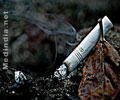Heavy drinkers who smoke have a tougher time quitting cigarettes than smokers who drink moderately or do not consume alcohol at all.

A growing body of research shows that hazardous-drinking smokers are at even greater risk for numerous health problems, including several types of cancer, than smokers who drink less. In the study, hazardous drinking was defined as a weekly consumption of at least 14 drinks for men and seven drinks for women at least once in the past year.
Given that 20% of all tobacco quitline callers drink at hazardous levels, the researchers saw an opportunity to explore how telephone counselors could help that subgroup, said the study''s principal investigator, Benjamin A. Toll, associate professor of psychiatry and program director of the Smoking Cessation Service at Smilow Cancer Hospital at Yale New Haven.
The results showed that hazardous drinking smokers who received alcohol counseling and a brochure about reducing drinking were significantly more likely to quit smoking than hazardous drinking smokers who received only tobacco counseling and a brochure about tobacco.
"This was the first quitline study to offer alcohol intervention counseling to hazardous drinking smokers, and we found that the quitline coaches can be trained to counsel that group effectively to improve smoking cessation and limit alcohol use," Toll said. "If quitlines across the country use this method, we could reach millions of people seeking help."
The study was supported by National Institutes of Health; the National Cancer Institute; the National Institute on Alcohol Abuse and Alcoholism; the New York State Department of Health; and the State of Connecticut, Department of Mental Health and Addiction Services.
Advertisement
Source-Newswise










